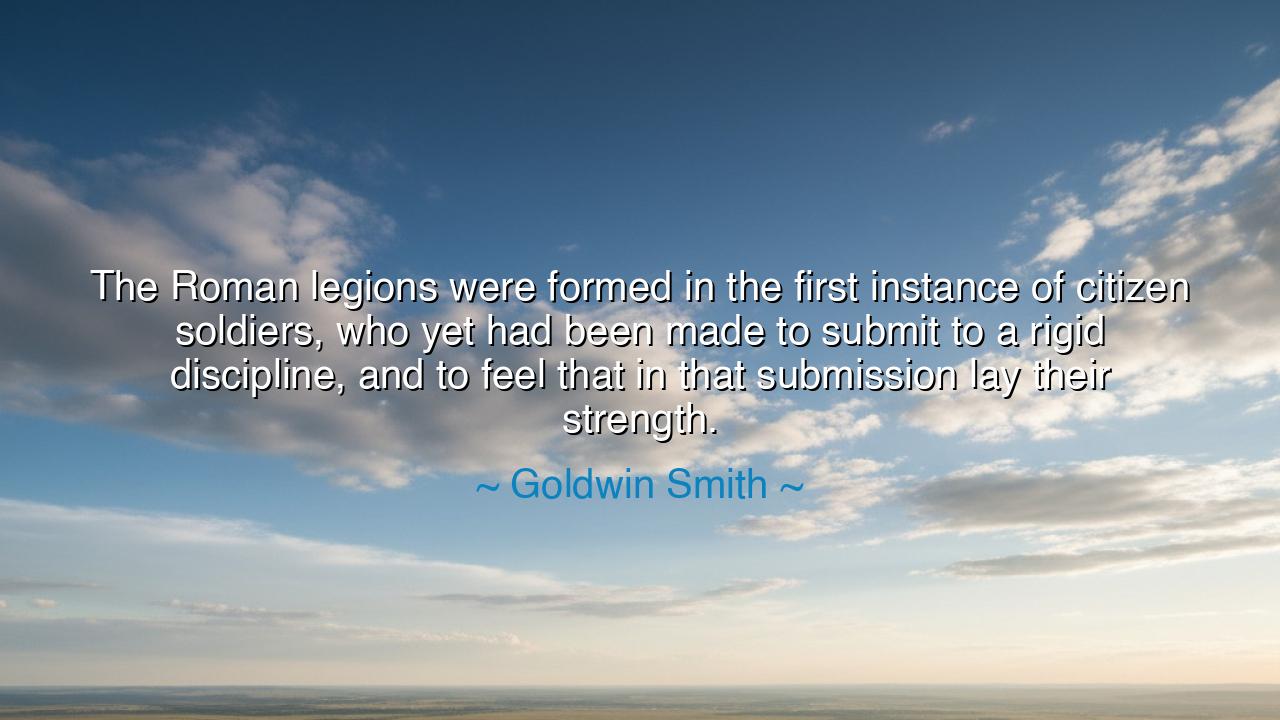
The Roman legions were formed in the first instance of citizen
The Roman legions were formed in the first instance of citizen soldiers, who yet had been made to submit to a rigid discipline, and to feel that in that submission lay their strength.






Hearken, children of history and virtue, to the words of Goldwin Smith, who reflected upon the might of the Roman people: "The Roman legions were formed in the first instance of citizen soldiers, who yet had been made to submit to a rigid discipline, and to feel that in that submission lay their strength." In these words lies a meditation on the nature of power, order, and the harmony of freedom and duty. Smith teaches that true strength emerges not from unbridled liberty, but from the willing embrace of structure, obedience, and shared purpose.
The first revelation is that discipline is the forge of power. The Roman citizen, free in the life of the polis, became formidable only when tempered by the rules, rituals, and hierarchy of the legion. Each soldier surrendered personal whim to the collective, yet in that surrender discovered a power greater than any individual might. The lesson endures: strength is born not in isolation, but in alignment with principles and the guidance of ordered effort.
History offers vivid testimony to this truth. Consider the campaigns of Scipio Africanus, who led disciplined legions against Hannibal and the Carthaginian forces. The citizens of Rome, though not professional warriors, achieved victory because they submitted to rigorous training, formation, and strategy, trusting in the order that harnessed their collective might. Individual valor alone could not triumph; the disciplined union of many forged a force invincible in cohesion and purpose.
Goldwin Smith’s observation also reveals a paradox of freedom: that liberty and discipline are not opposites, but complementary. A citizen learns to govern themselves by yielding to higher standards, rituals, and obligations. In this submission lies the discovery of true autonomy, for the self disciplined becomes capable of action, endurance, and moral courage far beyond unrestrained impulse. The legion was strong because its citizens understood the power of restraint and obedience.
The principle extends beyond warfare to civic life and personal endeavor. In communities, societies, and even within the soul, submission to principle, law, and shared responsibility cultivates strength. The ancient Athenians, while proud of their democratic freedoms, likewise depended upon civic rituals, public accountability, and disciplined engagement to preserve order and liberty. Power, Smith implies, is inseparable from responsible structure and disciplined practice.
Even in the modern era, the lesson endures. Consider Abraham Lincoln during the American Civil War: citizen-soldiers, volunteers untrained and inexperienced, were bound together by discipline, hierarchy, and shared purpose. Through this framework, their courage, resilience, and sacrifice were magnified, allowing them to endure trials that would have crushed uncoordinated effort. Obedience to training and principle became the wellspring of collective strength.
Practically, the lesson is to embrace discipline as a source of empowerment. Whether in learning, work, or civic duty, one must submit willingly to the structures, habits, and principles that cultivate skill and fortitude. Strength arises when the individual aligns with a higher order, trusting that obedience is not servitude but the path to mastery and influence.
Thus, let this teaching echo through the generations: the Roman legions were formidable not merely through courage, but through the union of citizen freedom and disciplined submission. In yielding to principle, order, and shared purpose, they discovered their true strength. Learn from their example, and recognize that in disciplined submission lies the enduring power to act with courage, wisdom, and lasting effect upon the world.






AAdministratorAdministrator
Welcome, honored guests. Please leave a comment, we will respond soon